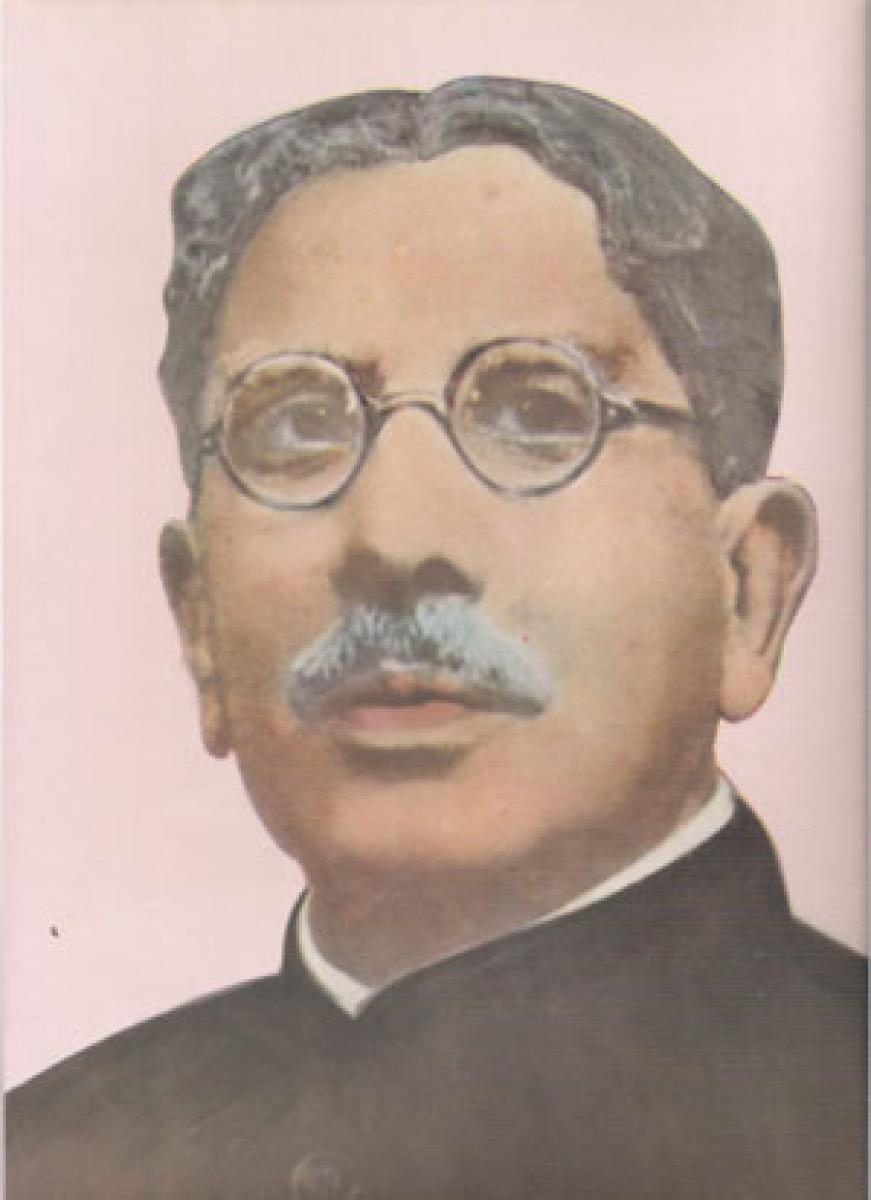Just In

George Barnard Shaw, a renowned English writer and thinker, identified three intellectual celebrities in India: Pandit Madana Mohan Malaviya, Chakravarthi Rajagopalachari aka Rajaji and Cuttamanchi Ramalinga Reddy aka Cuttamanchi aka C R Reddy. This remark is unusual for a person known for his intellectual arrogance.
George Barnard Shaw, a renowned English writer and thinker, identified three intellectual celebrities in India: Pandit Madana Mohan Malaviya, Chakravarthi Rajagopalachari aka Rajaji and Cuttamanchi Ramalinga Reddy aka Cuttamanchi aka C R Reddy. This remark is unusual for a person known for his intellectual arrogance.
It is said that Shaw used to say: "There are three persons in the United Kingdom, whom the country, can either hate or love; but can't ignore. They are George Barnard Shaw, G B Shaw and GBS.' Born on December10, 1880, in Cuttamanchi, a suburb of Chittoor, to Narayanamma and Subrahmanya Reddy, a flourishing legal practitioner of Chittoor, Reddy had his schooling in Board High School, Chittoor, went to a college in Madras and pursued higher studies at Cambridge, England.
When he was elected to the Madras Legislative Council on Justice Party Ticket in 1921, it was widely believed that Cuttamanchi was the natural choice for the post of the Education Minister in the Panagal Maharaja's Cabinet. Fate willed otherwise. He became the founder and Vice-chancellor of Andhra University . He guided the destiny of the prestigious institution for a record 18 years, from 1926 to 1931, and a second term from 1936 to 1949.
As a politician, legislator, President of the District Board and as an educationist, he played a major role in shaping the educational policy in India. He was also the recipient of a British Knighthood in honour of his service to the country. Known for ready wit and humour, Cuttamanchi spared none, but without offending the human dignity. Without laughing, he cut jokes on himself and plunged the audience into laughter.
Presiding over the fourth Reddy Jana Sangha Conference in Kurnool in 1920, he said: "Reddys are a courageous race; an enterprising people; made their genius felt wherever they went; Tokyo, London, Washington, Madrid, Paris, Shanghai, etc. But their natural habitat appears to be in Andamans." On another occasion, he said: "I am neither a bridegroom, nor corpse nor even a Minister."
In the Madras Assembly, when he was cirticising the extraneous influence, the Education Minister was pointing to his coat pocket, wherein he possessed letters addressed by Reddy. He shot back: "When lovers quarrel and separate, it is customary to return the letters exchanged.” Dissenting with the draconian actions of the government against the Congress volunteers during the Salt Movement, in 1930 he resigned from the Justice Party and joined the Congress.
He was arriving for the first time after resignation in the Madras Central Railway Station, pressmen gathered in large numbers to grill him. He said: "I need a porter in the RS (railway station) not a reporter," and added: "Politics is neither religion nor philosophy, but a practical art in which we judge more by results than methods." For him Bezawada was 'Blazewada' After giving up his political career, he became a bitter critic of some of the policies of the Congress. However, he did not mince words to denounce the autocratic British Rule.
He had full faith in the national movement. He opposed Gandhiji's call to non-cooperate with the British and the Allied Force in the II World War against Hitler's Germany and the Axis. But throughout Reddy's life, whether in public meetings or in private conversations, Gandhi was "Mahatma Gandhiji” for him."
Further, he was a firm believer and propagator of Gandhian principles: viz. cottage industry, khadi, vegetarianism, gram swaraj. More than one writer had confirmed that Reddy inconsolably sobbed, while speaking at the condolence meeting of Gandhiji at Andhra University on 31st January,1948. When Rayalaseema leaders were not interested, he dared question Nehru as to why he was not agreeing to form Andhra State.
Reddy is still being criticised by the Rayalaseemaites for selecting Visakhapatnam as the headquarters for the Andhra University. Speeches of Cuttamanchi are master pieces and more relevant than ever even after nearly a century. Every one of them differs with the other, but conveys his wholesome philosophy of life and mission.
Addressing a public meeting at the Gandhi Seva Sangha in Mysore in January 1950, he said: "Our masses, the village folk, men and women steeped in our ancient lore are educated. They may not be literate, but they are educated." In a talk on Ramakrishna Paramahamsa over All India Radio, Mysore, on 18th January, 1951, he said: "Ramakrishna is not a doctrine, philosophy, a disputation. He is life, sadhana, realisation." Reddy passed into eternity, on 24th February, 1951.
An educationist and political thinker, essayist and economist, poet and literary critic, he wrote his works and delivered lectures in Telugu and English; these reveal his deep love for Indian classics and his learning in these texts, as well as the modernity of his outlook. Delivering the convocation address of the Andhra University, in February1949, Rajaji rightly addressed him as "Your extraordinary Vice Chancellor".

© 2025 Hyderabad Media House Limited/The Hans India. All rights reserved. Powered by hocalwire.com







